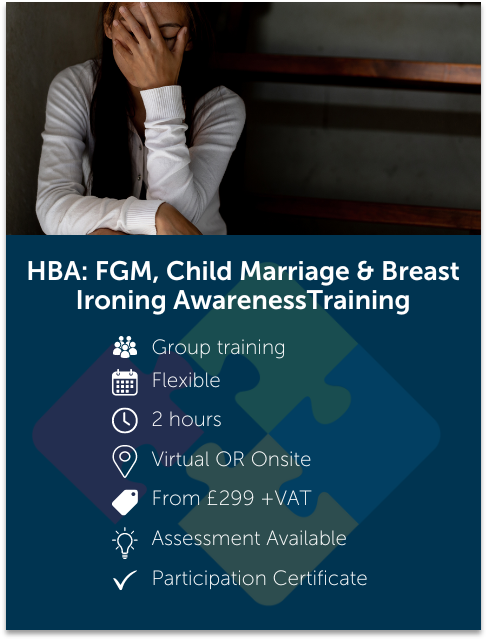
It's the law! ...what you need to know about Female Genital Mutilation (FGM)
International Day of Zero Tolerance to Female Genital Mutilation falls annually on the 6th February. The day was designated by the United Nations General Assembly in 2012 to raise awareness about the harmful practice of female genital mutilation (FGM) and to promote its elimination.
What is FGM?
FGM is recognised internationally as a violation of human rights, the health, and the integrity of girls and women.
It comprises all procedures that involve altering or injuring the female genitalia for non-medical reasons. Girls who undergo FGM face short-term complications such as severe pain, shock, excessive bleeding, infections, and difficulty in passing urine, as well as long-term consequences for their sexual and reproductive health and mental health.
The World Health Organisation has classified FGM into four different types:
- Clitoridectomy
- Excision
- Infibulation
- Any other harmful procedure e.g., pricking, piercing, incising, scraping etc.
The National FGM Centre offers a helpful explanation of each type.
Although primarily concentrated in Africa and the Middle East, FGM is a universal problem and is also practiced in some countries in Asia and Latin America. FGM continues to persist amongst immigrant populations living in Western Europe, North America, Australia, and New Zealand.
What does the law say?
Female Genital Mutilation (FGM) is illegal in the UK. The law relating to FGM is contained in the Female Genital Mutilation Act 2003.
The Act also extends to extra-territorial acts or omissions, meaning it applies to any person (regardless of their nationality or residence status) who performs FGM in England and Wales, assists a girl to carry out FGM on herself in England and Wales, or assists (from England or Wales) a non-UK person to carry out FGM outside the UK on a UK national or UK resident.
If FGM is committed against a girl under the age of 16, each person who is responsible for the girl at the time the FGM occurred could be guilty of the offence of failing to protect her from the risk of FGM. It is also an offence for a UK national or UK resident (even in countries where FGM is not illegal) to perform FGM abroad, assist a girl to perform FGM on herself outside the UK, or assist (from outside the UK) a non-UK person to carry out FGM outside the UK on a UK national or UK resident.
Resources:
What can schools and education providers do to help?
Learning about and having an awareness of FGM is a vital component of any school or education providers’ approach to safeguarding and child protection and, whilst it is an adult’s responsibility to protect children from harm, if children and young people are taught about FGM there’s more chance they will report it.
Every young person — as a citizen in a diverse society — should learn about FGM, but especially children and young people at immediate or future risk of FGM, and young people who have experienced FGM (they may or may not be aware of what has happened to them).
Students need to know:
- What FGM is and how it affects people
- What the law says on FGM
- How to manage the threat of FGM (for themselves or for others)
- How to seek help and support if FGM has happened (for themselves or for others).
So, what can you do to support International Day of Zero Tolerance to FGM?
- Talk about it! Create awareness about the human rights challenges faced by women and girls around the world. Spread the word on various social media platforms for greater reach.
- Educate yourself and others about the topic of generational social and cultural conditioning around women’s bodies. Only with knowledge and understanding can we engage in the constructive dialogue needed to drive change.
Resources:
Why do schools and education providers need to be aware of FGM and what are their responsibilities?
Schools and education providers play a crucial role in safeguarding young people from FGM, they also have specific responsibilities including a mandatory reporting requirement.
Awareness
Those working directly with children should be aware of what FGM is, the communities at risk, and the signs that a student might be at risk.
Understand the increasing risks for early years and primary school settings.
Mandatory reporting
The FGM Act 2003 (as amended by the Serious Crime Act 2015) imposes a legal duty on teachers, and those in teaching work,in England and Wales to report known cases of FGM in under 18-year-olds to the police. This includes cases where a girl under 18 informs them that an act of FGM has been carried out on her, or they observe physical signs which appear to show that an act of FGM has been carried out on a girl under 18.
Remember, FGM is illegal and considered as child abuse in the UK. If you suspect a student might be at risk, it’s important to take action and report it to the appropriate authorities.
Resources:
HBA Staff Awareness Course Outline
Our HBA staff awareness course is designed to raise understanding of honour-based abuse, including FGM, and covering signs, barriers to disclosure, and promoting confidence in dealing with concerns.
A safeguarding approach to honour-based abuse that covers the definition, prevalence in society, identification of vulnerable individuals, and recognition of triggering behaviours.
The course specifically addresses female genital mutilation, virginity testing, forced marriage, breast ironing, and explores honour-based abuse within the LGBT+ community. It additionally considers the challenges and barriers victims encounter in disclosing abuse and examines the indicators of disguised compliance.








